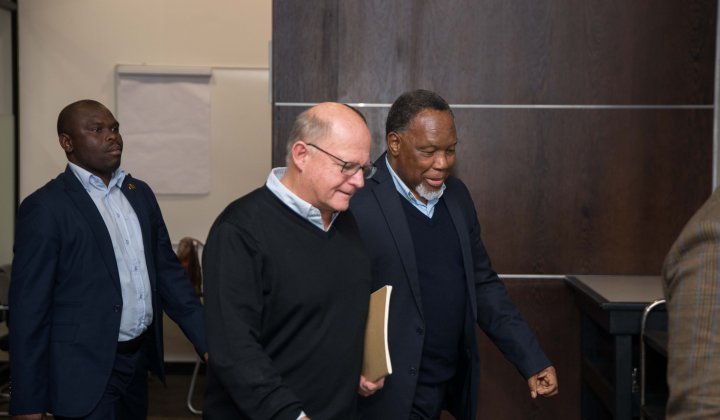'Pivot' is my pick for the word of the year in 2020, beating off a challenge by “the new normal” by a short head. ‘Pivot’ has become widely adopted as a way to describe how business – and business schools – rapidly adopted digital platforms and technologies to keep working during the hard lockdown and now during what seems to be a prolonged period of social distancing and further potential lockdowns. The big question now is the extent to which the business models adopted at speed during lockdown will become permanent. What does seem clear is that the new normal will be highly digitalised, and some excitable souls are already proclaiming the death of the corporate office and the inauguration of totally distributed corporations. Perhaps the same will be true of business schools.
While there can be no doubt that digital technologies – and the ability to pivot into a digital mode – were a major factor in allowing organisations to survive during lockdown, there are growing signs that the “everything digital” prophecy is going to turn out to be an oversimplification. That is particularly true for academic institutions, particularly ones like GIBS, which occupy a liminal position between business, society at large and the academy. What is certainly true, though, is that the pandemic and its impacts constitute a disruption of gargantuan proportions that will test the ability of all organisations to respond to change at multiple levels.
In a case note on GIBS’ response to Covid-19, Professor Louise Whittaker, executive director: Academic Programmes, as well as Hayley Pearson, interim executive director: Faculty, and Professor Nicola Kleyn, former GIBS Dean and now Dean of executive education at the Rotterdam School of Management, make the point that dynamic capabilities lay at the heart of the organisation’s capacity to respond successfully to a situation which was changing in unexpected ways. For example, it was initially possible to allow students who had connectivity issues to access online content by visiting the campus and using the WiFi, but this became impossible when lockdown started. Similarly, staff who were using campus facilities to teach from could no longer use them and had to livestream from home. Of course, there was also a continuous process of trial and error to work out what methods suited individual faculty and to design lessons to accommodate these differences.
One could go further and argue that the concept of dynamism is going to be critical to business schools as they navigate what looks like a set of challenging circumstances over the foreseeable future. The case note rightly states that the implied “can do” attitude implicit in dynamism is underpinned by GIBS’ corporate culture.
It’s becoming clear that, for GIBS and other business schools, and business in general, technology is only one of the factors that will influence how the lessons of Covid will be used to change the way things are done. In other words, there will be no simple progression from one state (in-person teaching) to another (online teaching), but rather a rethinking of the whole concept of a business school and its place in the world.
What’s the value proposition?
During the initial phases of the Covid crisis, GIBS, like most organisations, had to adopt digital ways of working with great rapidity – a process that was considerably helped by the fact that the institute was already advanced along the digitalisation road, notes Adrian van Eeden, GIBS CIO. Van Eeden and his team were, of course, intimately involved in the successful efforts to get teaching online, but early on it became clear that the issues were never simply about technology itself, or about how to make it available to students who might find themselves in situations that made online learning less than ideal because of home circumstances, poor connectivity infrastructure or high bandwidth costs. These were and are issues, but bigger ones emerged.
Professor Whittaker sums up these bigger issues in one word: ‘execution’. For Adrian van Eeden, it’s all about understanding what the organisation’s value proposition is. The challenge for GIBS is that a key part of what it offers is reliant not on technology but on the in-person campus experience. Nick Binedell and the GIBS founding team went to enormous pains to design a campus that would deliver a certain kind of experience; one that promoted interaction and collaboration.
“The campus experience is huge. The GIBS campus has a definite vibe or energy, and it brings people from different areas together. It elevates you as an individual,” says Pearson. Most people echo her sentiments. “That’s hard to replicate online, and the conversations in the coffee shop and the quads feed into the classroom teaching,” she adds.
Teaching, and how it is done, is also an issue. As Professor Whittaker points out, the hallmark of GIBS’ teaching philosophy is the Socratic method, which fundamentally uses skilful questioning and argument to stimulate critical thinking, debate and idea generation. As many have observed, too, the life experiences of the students participating in this process make the classroom experience very enriching. A current MBA student remarked how he was looking forward to returning to campus because “that’s where the learning happens”.
Professor Whittaker distinguishes between distance and contact learning and emphasises that GIBS is very much a contact learning institution. “It’s hard to do that online,” she observes drily. (See the box for some rules of engagement relating to online teaching)
In business, it’s frequently observed that digital transformation is partly driven by the need to put customer experience (Cx) at the heart of the business model. The pervasiveness of digital technologies means that providing a satisfactory student experience (Sx) is equally important and a key element of the business school’s value proposition. Sx implies a move towards customising the learning experience that is likely to influence what future business schools look like.
The interplay between Sx and technology is complex and will need to be explored over time. Clearly, technology can be useful because it cuts down on travel and can be used to make content more easily available to people who might not be able to come to campus. However, Nishan Pillay, executive director: Digital at GIBS, notes that the transfer of in-person content to digital channels is not simple. One basic issue is that superstar lecturers may not have the technique to shine online, at least without training. It will be necessary to build a skills ecosystem to supply the new skills needed to deliver gripping online content. “Students value engagement with faculty and peers but they also value flexibility,” he says. “Blended solutions are going to be very important.”
All of this points to the need for the business school of the future to pay great attention to the way in which courses and teaching methods are designed.

Perils of skeuomorphism
In the context of design, Van Eeden cautions against skeuomorphism, or the design concept of making items represented resemble their real-world counterparts. He argues that a potential pitfall when considering the implications of digitalisation is to try and replicate the real-world experience online. Pillay shares this view.
The point here is that by attempting to replicate the characteristic campus experience online, one risks disappointing students by delivering a pale version of “the real thing”. A better approach would be to design a more customised study experience geared to the individual student and does not attempt to move the existing model online. As Pillay points out, there is a younger generation of digital natives who perhaps have different expectations anyway. The principle of blending will bring together synchronous (i.e., livestream or real-time) and asynchronous (i.e., recorded or designed) content, perhaps with elements of gamification, to suit the needs of a variety of audiences.
“Education generally is guilty of skeuomorphism, not just in the way it tries to replicate traditional teaching models online but also its archaic assessment models,” argues Van Eeden.
What are business schools for?
The digital acceleration – and profound disruption – prompted by the pandemic has to be seen within a broader context of a continuing debate about the nature and role of business schools. A good introduction to this debate is contained in an article by Ken Starkey and Howard Thomas, the latter a member of the GIBS Advisory Board.1 The crux is that business schools have abandoned their initial goal of contributing to the public good by developing management as a profession and have become business’ “hired hands”. Professors Starkey and Thomas agree that there are some truths in this criticism. In their article, they reference Wallace Donham, the Dean of Harvard Business School during the Great Depression, who believed that business schools should not exist for the benefit of an elite minority, and should “think in terms of broad social problems and ineffective social systems instead of focusing on individual companies”.
One remedy would be to introduce elements of the liberal arts curriculum, to enable both faculty and students “to converse in the great traditions of thought and expression, before instruction in specific management training”.2
It’s a good point, but, as Professor Whittaker points out, while it’s always enriching to incorporate different viewpoints into a course, the curriculum is already somewhat crowded.
One might add, too, that the colonisation of humanities departments by Neo-Marxist,s and the generally illiberal climate currently prevailing in many universities, might (temporarily, one hopes) have created an atmosphere inimical to a constructive engagement with management training.
At this point, it is worth emphasising here that, from its inception, GIBS has consistently championed the notion of responsible business leadership and the role that business must play in solving societal problems. For example, the GIBS Ethics Think Tank is one recent initiative that aims to make ethics a measurable business practice, and GIBS was selected as one of 38 prime champions of the United Nations Global Compact and Principles for Responsible Management Education in 2018/2019.
“A GIBS MBA has always been about more than making money,” Professor Whittaker observes.
Besides being a member of the GIBS Advisory Board and a Professor Extraordinaire here, Professor Thomas is also Professor Emeritus at Singapore Management University (SMU) and the Ahmass Fakahany Professor of Global Leadership at the Questrom School of Business, Boston University. He has been a business school dean four times and is passionately committed to education as a force for inspiring talented people. He argues that many business schools have become reliant on a constant flow of well-heeled, often foreign students willing to pay through the nose for degrees that are more connected to their climb up the corporate ladder than to broader social or economic goals.
At the same time, their research has often become either too academic or too focused on profitability, and not about the bigger issues.
“Before the pandemic struck, though, we were starting to see surveys indicating that students were becoming less willing to pay high prices, and were looking for greater flexibility in how the training was delivered,” he says.
That trend is likely to be strengthened by the pandemic, which is simultaneously choking the flow of foreign students and showing that what was thought to be impossible can, in fact, be done. According to Professor Thomas, the key issue is not whether blended learning is better than classroom instruction, but rather what the optimal balance is. He argues that courses that are well-designed pedagogically and offer a range of ways to get the qualification are likely to do well. For example, enrolments for the blended learning, part-time MBA offered by Boston University’s Questrom School of Business with edX, the digital platform founded by Harvard and MIT, are booming. Tuition will cost US$24,000, compared to the US$100,000 or more charged for traditional face-to-face, two-year MBAs.
Ultimately, he believes, the pandemic has disrupted an academic model that has become somewhat stale. “If I had to predict, I think we could see foundational management education becoming cheaper, particularly for undergraduate programmes, and delivered in a blended learning form, while the traditional, post-experience business schools would focus on delivering MBAs, executive education and doing impactful research,” he says. “In Africa, the imperative is to find ways of educating a large number of people effectively using an online, hybrid model, or the continent’s potential will never be realised.”
Building the business school of the future will be neither easy nor quick. On the one hand, there are many nuances relating to the execution referenced by Professor Whittaker, particularly the attempt to provide an experience that matches (even if it does not mimic) the traditional campus experience. On the other, there is a wider disruption implicit in the move towards digital. Where that will lead, who knows, but one thing is certain: only business schools with innate dynamism will succeed.
Rules of engagement
As GIBS inches towards new teaching models that remain true to its core value proposition of contact teaching, a key issue is student accountability in terms of full participation. Some principles:
- Videos should be turned on, at least when the student is talking, to maintain the “human” element.
- Attendance has to be compulsory even when classes are hybrid (i.e., a mix of online and in-person participants). Online non-participants are summarily removed by the session producer.
- Warm and cold calling should be used to promote participation. Warm calling means the student is warned via the chat line that a question is coming, while cold calling is an unheralded question.
- Online participants should continue to be in business attire as required in person – a point made by the students themselves.
- Introduce a class participation mark to underpin the Socratic method, but then care must be taken to incorporate suitable activities.
… the concept of dynamism is going to be critical to business schools…
“The campus experience is huge… That’s hard to replicate online…”
… business schools should not exist for the benefit of an elite minority…
… research has often become either too academic or too focused on profitability…
1 Ken Starkey and Howard Thomas, “The future of business schools: shut them down or broaden our horizons?”, EFMD Global Focus 13(2), available at https://www.globalfocusmagazine.com/the-future-of-business-schools-shut-them-down-or-broaden-our-horizons/
2 Howard Thomas, “Apply liberally: Towards a model of liberal management education”, EFMD Clobal Focus 14(1), available at https://www.globalfocusmagazine.com/apply-liberally-towards-a-model-of-liberal-management-education/







